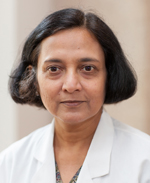August 2013

Ruxana T. Sadikot, MD,
MRCP
While studying for her medical degree in at the University of Mumbai (then University of Bombay) in the late 1980s, Ruxana T. Sadikot, MD, MRCP, visited the tuberculosis ward with her classmates and was astounded by how the disease could ravage a patient’s respiratory system.
“People with advanced TB can almost have destroyed lungs—the physical signs can be so profound,” Dr. Sadikot says.
As they made the rounds in the TB ward, Dr. Sadikot and her peers would make rough sketches of what the damage might look like inside the lungs, and then hold them up to the actual X-rays.
“In the developed countries, people tend to rely heavily on technology and less so on a physical examination and observation. This was the complete opposite,” Dr. Sadikot says. “But it was the thing that fascinated me the most.”
This initial fascination would inspire a career dedicated to investigating infectious diseases. Today, Dr. Sadikot is chief of the Section of Pulmonary and Critical Care Medicine at Malcom Randall VA Medical Center, North Florida/South Georgia Veterans Health System, associate professor of medicine at the University of Florida, which she transitioned to less than a year ago from her previous position as associate program director of the Division of Pulmonary, Critical Care and Sleep Medicine at the University of Illinois at Chicago.
She primarily cares for patients who inform her research in four areas: acute lung injury and sepsis, bronchiectasis and infections, nosocomial pneumonia and host defense, and prostaglandins in innate immunity. She’s become an authority, having published 70 papers in respected journals, including the American Journal of Respiratory and Critical Care Medicine, presented 60 abstracts at national and international meetings, and contributed to several textbooks and non-peer reviewed publications.
The Department of Veterans Affairs has directed funding toward Dr. Sadikot’s research, and she’s received regular support from the VA for her investigations into signaling pathways in pulmonary host defense and, combined with an award from the Gatorade Foundation at the University of Florida, her current examination of TREM-1, a protein that triggers an immune response in the lung.
“At least the initial studies show that TREM-1 was upregulated only with infectious inflammation, although now we realize that it might be upregulated in noninfectious inflammation and in other conditions as well, such as malignancies,” Dr. Sadikot notes. “If you want to modulate TREM 1, we have a small soluble peptide to block the expression, but the challenge is the delivery. I’ve been working with the UF Department of Pharmacology and Therapeutics to develop novel methods.”
More than anything, she finds research to be the most difficult aspect of her work. “It’s very intimidating, and it brings more and more challenges, but it’s a continued learning process,” she says. “The intellectual stimulation is what keeps me going.”
But Dr. Sadikot is surely no stranger to extreme challenges, having earned the notoriously labor-intensive Membership of the Royal College of Physicians, or MRCP, in London while studying pleural disease under Dr. Anthony Arnold. From there, she completed a registrar in respiratory medicine at the Yorkshire Health Trust in Leeds, a residency at the University of Arkansas, and a fellowship in pulmonary and critical care at Vanderbilt University, where she also worked on pleural diseases with Dr. Richard W. Light, MD, (a 2009 recipient of the ATS Distinguished Achievement Award).
“In England, I would have had to do anesthesia, and I wanted to stay within internal medicine,” Dr. Sadikot says of her emigration from across the pond. “Critical care medicine is like general medicine put on steroids. You treat people acutely; get them better and out of the ICU. That gives a lot of satisfaction.”
As an award-winning educator, she has made it her mission to impart her enthusiasm for the field of pulmonary medicine and research onto her residents, fellows, and mentees who have included Humam Farah, MD, of the Hannibal Clinic and Hannibal Regional Medical Center.
“Dr. Sadikot’s main strength is her wonderful personality,” says Dr. Farah, who is collaborating with her on the development of biological therapy for patients with uncontrolled asthma. “She always puts others ahead of her own interest. I would say I am blessed to be mentored by her.”
To Dr. Sadikot, a great mentor exhibits an essential trait—passion. “You have to be passionate about what you’re doing,” she says. “Creating that passion, generating that passion is both ways. If the mentor is passionate about they are doing, the mentee will automatically feel it.”
In the end, it comes down to the patient in the ward. “Helping people get better is the biggest gratification you can have. And there will be challenging situations, where you know there’s not a whole lot you can do, but this is what drives us into research. We want to answer those questions.”
Life in ATS
ATS Member Since: 1997
Primary Assembly: Allergy Immunology & Inflammation
Dr. Sadikot serves on the Members in Transition and Training Committee and has also served on Assembly on AII Program Committee. “As a person interested in pulmonary medicine, I’ve always enjoyed the journals, interacting with people at the meetings. It’s a great organization to be a part of to develop your clinical and professional skills and research, and it provides a good opportunity for the younger folks to meet senior people.”

